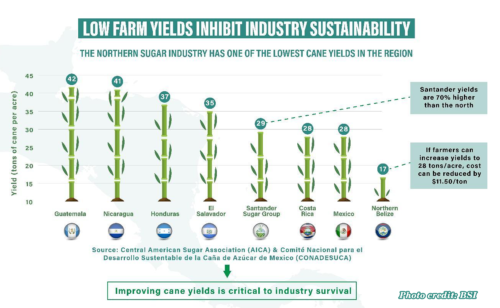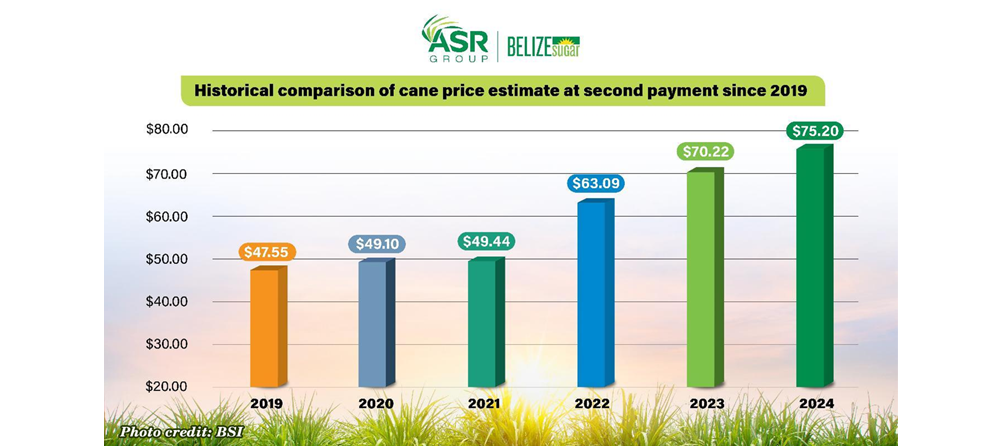ORANGE WALK, Wed. Aug. 21, 2024
The 2023-2024 sugar crop season ended up north on July 21, and a month later, Belize Sugar Industries Ltd. (BSI) informed that farmers will be getting “a record second cane payment, reflecting a record second cane price estimate of $75.20, some five dollars above last year’s record price.” At a press conference today, BSI’s Director of Finance, Shawn Chavarria happily announced that this payment sets a new record over the 2022-2023 crop season – a difference of $5.00. Prior to that, the previous record had been set in 2015.

Chavarria credited the record price to “some of those investments that we’ve made to improve the value of the sugar that we’re producing, and also to lower the logistics cost.” Separately, however, there has been an improvement in global sugar prices. Chavarria called it a “good day for the industry”, and looking forward to the third payment due in November, he stated, “We believe there is also potential for upside there.”
On the downside, the crop season is marred by lower yield than expected. A total of 1,027,462 tons of cane were delivered to the mill, and 102,718 tons of sugar were produced. Though about 40,000 more tons of sugar cane were milled this year compared to last year, less sugar was produced than last year. Chavarria explained, “We could possibly have obtained at least maybe 3 to 4 thousand tons more sugar from the cane if we had maintained a similar quality. That would have certainly translated into much more revenue and a better cane price for farmers.”

Addressing the issue of stand-over cane left in the fields un-milled, Chavarria reported that the Sugar Cane Production Committee (SCPC) is conducting an assessment to determine the actual figure; however, it is believed to be anywhere between 60,000 to 100,000 tons of cane. This is notwithstanding the fact that the crop was extended by between two and four weeks. Among the factors that contributed to the stand-over cane, Chavarria blamed the impasse with the Belize Sugar Cane Farmers Association (BSCFA) which led to a delay in the start of crop of about 12 to 14 days. He added that, though BSI wanted to start the crop on December 14, the Sugar Industry Control Board (SICB) failed to gazette that date, setting instead December 28, 2023 as the start date. Thirdly, Chavarria points to heavy rains starting earlier than usual toward the end of the crop season. That led to interrupted deliveries and higher mud levels that started causing production issues for the mill. To ward off such potential challenges in future, Chavarria urges the players in the industry to seek to start the crop early.
As to the question of whether the company should compensate farmers for stand-over cane as happens elsewhere, Chavarria said having stand-over cane occurs from time to time and therefore “is not an uncommon thing.” He added that if there had not been a delay at the start of the crop, they could have milled the cane that is now left in the fields. He then declared, “So, from our perspective, we don’t feel we bear any responsibility for any standing cane because we were ready to start the crop earlier last year, but were prevented from doing so.” Chavarria says BSI also took a loss, as about 10,000 tons of its cane remains in the BSI fields; and though it is expected that they ought to deliver it come December 2024, the quality will not be as good as if they had milled it in June.
The BSI director is hopeful of a smoother start to the 2024-2025 sugar crop season, given that the interim agreement signed between BSI and the BSCFA in January this year was for two years. He said there would more be a challenge for the 2025-2026 crop if an agreement between the parties is not reached by then.
On the production end, in its release, BSI reported that Belize has the lowest yield of tons of cane per acre compared to Guatemala (42 tons), Nicaragua (41 tons), Honduras (37 tons), El Salvador (35 tons), Costa Rica (28 tons) and Mexico (28 tons). In fact, based on data from the Central American Sugar Association, BSI notes that even Santander Sugar Group at 29 tons has a higher yield than the sugar industry in northern Belize at 17 tons per acre. That is a difference of 70%. Chavarria says stakeholders in the north are beginning to pay more attention to this reality to try and turn things around. He pointed to programs coming on stream, including one with grant funding from the Green Climate Fund that will lead to better yields based on better varieties of cane that are more climate resilient. He commented, “I think it’s a message that has taken a very long time, yes, to resonate with stakeholders; but I think it’s one that is finally being acknowledged, especially given [that] you have another sugar mill in Belize who … they have a very productive farm. They have very good yields. And I think it is showing everyone the potential that is out there to improve the farms sector.”
BSI has enough sugar for local market through to 2025
Now that milling has come to an end for this crop season up north, Chavarria was asked about having sufficient sugar to last us locally until the next crop season in December. Chavarria affirmed that they do conduct a level of due diligence by ensuring that they are monitoring sales and scrutinize any new customer “to ensure that it is meant for a legitimate business purpose.” The same happens, he says, for those who want to double their purchase.
According to Chavarria, “We certainly have enough inventory on hand to take us through to the end of December and January of 2025, but we have to keep up that vigilance …” Chavarria also declared that they continue to provide any information requested by the Supplies Control Unit regarding the buyers of the sugar produced by BSI. However, he reiterated that they have no control over the porous borders to prevent any BSI sugar from going across our borders.

